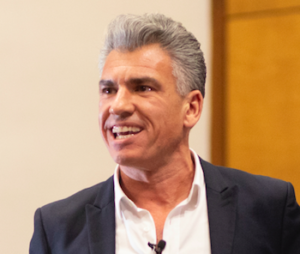One month into his new position as MD of Licensing International’s UK division, the licensing industry stalwart Graham Saltmarsh has already begun to cook the plans with which he aims to give the organisation the shake up that the year 2020 has required of it. Whether it’s the proposed introduction of master classes from the industry’s leading experts, or the plans so clandestine he simply can;t share them yet, there’s one thing that Saltmarsh promises, they certainly won’t be boring.
As the world now begins to find new footing in the shifting sands of current events and develop and fine-tuned what has been dubbed ‘the now normal’, so too does Licensing International’s UK arm look to move with them.
As Festival of Licensing gets underway today, celebrating the global licensing industry with a month-long virtual experience of content from each of its corners, Licensing.biz grabs its moment to talk with Licensing International UK’s new managing director, Graham Saltmarsh about his own plans for the role, his proudest moments in licensing, and why his mates thinks he works in a pub.
So, MD of Licensing International’s UK division – that’s a great title to have. What does the move mean to you?
I have been talking to Licensing International for a while about how we can help promote licensing as an industry, not only within our own ranks but to a wider audience. I have worked in licensing for many years and still when I explain what I do to people outside the industry they either say “Oh, so do you work in a pub?” (sometimes!) or they say “your like Tom Hanks in Big and you just play with toys all day” (if only). I am very excited about my move to Licensing International and I’m looking forward to making people see the benefits of licensing and how amazing we are as an industry.
Bringing an established industry figure such as yourself to the fold is quite the win for Licensing International, too. How will this, and you, help shape a new era for Licensing International?
I intend to start with the basics and make sure we are getting these right, I have been in touch with as many Licensing International members as I could get hold of to ask what we are getting right and what we could do better, we need to provide our members with information and services that they actually want and will find useful. Even non Licensing International members have been in touch to offer their opinions (there are no wall flowers in licensing).
I have had a very exciting and varied career in licensing and so many people have helped me along the way so working with Licensing International, it feels like I am able to give something back and build a stronger more recognised industry.
An illustrious career across the licensing industry to your name, what spurred the move over to this side of the business? And what learning do you think you will bring to the table to shake things up for the UK division?
When you work for a big organisation there is a lot of pressure to bring in the next deal or launch the next big property but this huge pressure sometimes means that properties are launched too soon or with not enough research / insight or with the wrong partner. Licensing International has terrific global insight and can help put property and product launches into a bigger perspective which hopefully reduces the risks.
I have plans for short master classes (30 mins max) from industry experts and from people outside of our industry to give practical help and advice, I have some exciting plans for 2021 but it’s a little too early to reveal them just yet but you know me, they won’t be dull…
It’s been a… funny old year, that has seen big changes across licensing – what do you make of the resilience of the UK licensing space in the face of the pandemic and the changes it has brought to almost all aspects of the business – from retail, to what licensing means in 2020?
The old adage, Fail to prepare then prepare to fail, has never been so true. Some companies I have spoken to immediately embraced the new normal and pivoted their business to a more online proactive way of doing business while some have sat and waited to see what happens.
Some areas have found life tough but the counter balance is that the games, wheeled, puzzles, art & craft, apparel and many other areas have seen very positive results. Licensees are never slow to spot an opportunity (branded face masks) so I am very positive about the future. Retailers still need to sell product so are more open than ever to offer their customers something a little different or special. The Natural History Museum and Roald Dahl collaboration with M&S is a great example.
It’s been a period that has sped up a lot of those more inevitable changes, i.e, the lean in to digital and virtual platforms – how have we seen the licensing space adapt and evolve? What of these changes do you think the industry will carry with it going forward?
I’m sure I’m not alone in saying I was dreading moving to online meetings with all the potential technical pitfalls, I would normally be calling for the IT team because someone wanted to actually see me on my computer… However, the reality is that we have all had to just get on with it and learn new skills and it looks like we will be working from home for some time to come.
I do miss the buzz of a trade show and the unexpected corridor meetings but as these can’t take place at the moment we have to try new things and the online Festival of Licensing will just be another thing we will have to get used to for the time being. It’s difficult to see how the UK leaving the EU will effect business and in turn how this will effect the Treaty of Rome, tariffs, cross border shipping etc, but we are a very nimble and adaptable industry, so I’m sure we will survive.
As big a negative impact the situation has had around the world, there’s a sense of excitement around the potential that changes have unleashed in certain areas of licensing – what stands out the most for you in terms of the UK space?
There are so many changes happening, from multiple source manufacturing (some companies had 100 per cent of their manufacturing in China), smaller companies embracing on-line retail and using sales data to show bigger retailers there is a market for their product, the licensing industry has always been brilliant at innovation and this doesn’t seem to be slowing down during the pandemic if anything people have had a chance to pull back and allow themselves some thinking time which I highly recommend.
What will Licensing International’s role be moving forward in helping the industry adapt and evolve with the changes?
My role with Licensing International will be to offer my UK members insights (there are many reports available to our members!), support, education and somewhere they can just bounce ideas around with like minded industry people. It’s important to know that you have somewhere to turn to if you have questions, if you want to know who the best person to talk to about counterfeiting, trademarking, design, distribution, promotions and the many other questions I have been asked already. I will listen to the needs of our members and adapt as necessary as we all have been doing.
What are you most looking forward to for the coming year and in the position that you are in? What’s been the proudest moment of your career to date?
I am most looking forward to getting back in touch with the many friends and colleagues I have in the licensing industry and seeing what I can do to help them grow their business and grow the industry.
There are so many things to be proud of, when we won an award at the Licensing Awards – this is the industry we work in saying you are doing something right, I am a very proud supporter of the Light Fund which pulls the whole industry together to raise money for incredible causes. Sometimes it’s the smaller things, like seeing a kid in the street carrying a toy we have developed or wearing a T-shirt for a property we have built up over many years.
I don’t know if proud is the right word but I know a lot of people in the licensing industry called around their friends, colleagues and “competitors” during lockdown just to check in and make sure they were alright – this is the industry I’m proud to work in.
Anything you’d like to shout about?
No I think they will have had enough of me by now….

















